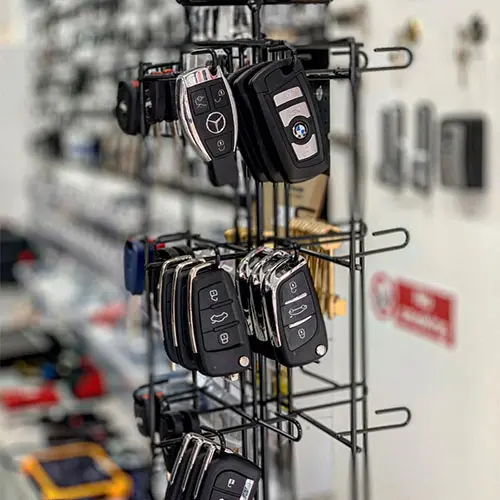You'll Be Unable To Guess Emergency Car Key Repair's Tricks
페이지 정보
작성자 Tahlia 댓글 0건 조회 184회 작성일 25-07-24 04:45본문

Emergency Car Key Repair: A Comprehensive Guide
Car keys are a vital part of vehicle ownership, and their sudden breakdown can trigger considerable hassle. Whether lost, broken, or damaged, understanding how to deal with emergency car key repair (just click git.camus.cat) is essential for any vehicle owner. This thorough guide checks out different elements of car key repair and replacement, addressing common issues, prospective solutions, and the value of expert services.
Understanding Car Keys
Modern car keys been available in different types, each including unique technologies and performances. The main types include:
- Traditional Mechanical Keys: The easiest type, these keys operate through a mechanical locking mechanism.
- Transponder Keys: Equipped with a chip that interacts with the car's ignition system for improved security.
- Key Fobs: Remote gain access to systems that frequently include keyless entry features.
- Smart Keys: Advanced systems that enable keyless ignition and entry, normally discovered in newer cars.
Common Issues with Car Keys
In emergency scenarios, understanding the reason for car key breakdown can assist determine the best technique for repair. Some frequently experienced problems include:
- Key Breakage: Often takes place due to wear and tear or excessive pressure when placing or turning the key.
- Lost Keys: Misplacement or loss of keys can leave a vehicle owner stranded.
- Dead Key Fob Battery: A typical problem with remote keys, resulting in failure in keyless entry or ignition.
- Transponder Key Malfunction: If the chip in the key is harmed, the vehicle may not recognize the key.
- Lock Cylinder Issues: Problems with the ignition or door lock cylinders can prevent the key from turning correctly.
Do It Yourself Emergency Car Key Repairs
Before availing expert services, specific situations might enable for DIY repairs. Nevertheless, these techniques depend upon the concern at hand. Below are some methods:
1. Broken Key Repair
Materials Needed: Super glue, a set of pliers, and damp wipes.
Steps:
- Carefully align the two pieces of the broken key.
- Use a percentage of very glue to the break and hold the key together for a couple of minutes.
- Wrap the key with tape to provide extra support while the glue dries.
- If the key breaks once again, think about getting a duplicate made.
2. Dead Key Fob Battery Replacement
Materials Needed: New battery (normally CR2032), little flat-head screwdriver.
Steps:
- Open the key fob using the screwdriver.
- Remove the old battery carefully.
- Change it with a new battery, making sure the positive (+) side faces the right direction.
- Close the fob and test the functions.
3. Lock Cylinder Issues
If your key won't turn in the lock, it might be due to debris or concerns with the cylinder itself.
Products Needed: Lubricant spray, an old toothbrush or fabric.
Actions:
- Spray a small quantity of lubricant into the lock cylinder.
- Utilize a cloth or old tooth brush to clear any debris or dirt.
- Try to turn the key carefully.
When to Seek Professional Help
While many problems might be resolved through DIY methods, some issues require the know-how of an expert locksmith or car dealership. The following situations normally warrant professional intervention:
- Severe Damage: If the key is substantially damaged or broken, replacing it may be needed.
- Transponder Key Issues: Expert reprogramming may be required if the key stops working to interact with the vehicle.
- Key Duplication: For complex key types, a locksmith ensures precise duplication or replacement.
Benefits of Choosing Professional Services
- Expertise: Professionals have the required training and experience to deal with numerous kinds of keys.
- Time Savings: Instead of experimentation, experts can resolve problems efficiently.
- Access to Technology: Locksmiths can reprogram transponder keys and key fobs that need customized equipment.
Contrast Table: DIY vs. Professional Services
| Aspect | DIY Solutions | Expert Services |
|---|---|---|
| Cost | Low (very little tools) | Higher (service fees) |
| Skill Required | Standard | Advanced |
| Time Efficiency | Variable | Quick |
| Repair Capabilities | Minimal to small issues | Wide variety of repairs |
| Tool Accessibility | Basic tools | Specialized devices |
Frequently Asked Questions (FAQs)
1. Can I get a car key made without the initial?
Yes, a locksmith can frequently develop a duplicate key using the vehicle's VIN (Vehicle Identification Number).
2. How long does it take to replace a car key?
The time required depends upon the key type and the complexity of the locksmith's work. Basic keys might take a couple of minutes, while electronic key fobs might take longer.
3. Will my car warranty cover key replacement?
Usually, car service warranties do not cover key replacement. Nevertheless, it's best to inspect with your car dealership regarding protection specifics.
4. Is it safe to purchase car keys online?
Buying car keys online can be dangerous; it's crucial to ensure that the provider is reliable. Lots of keys need programming that can only be done by specialists.

5. What should I do if my key gets stuck in the ignition?
If your key is stuck, avoid forcing it out. Instead, turn off the vehicle, ensure the gear is in 'Park,' and carefully wiggle the key. If it doesn't come out, seek expert help.
Handling emergency car key repairs can be daunting, but comprehending the kinds of keys, common problems, and repair choices can reduce the stress. While DIY approaches can be efficient for minor repairs, understanding when to get in touch with a specialist can conserve time, aggravation, and ultimately, cash. By being proactive and informed, vehicle owners can ensure they are well-prepared for any car key emergencies.
댓글목록
등록된 댓글이 없습니다.

